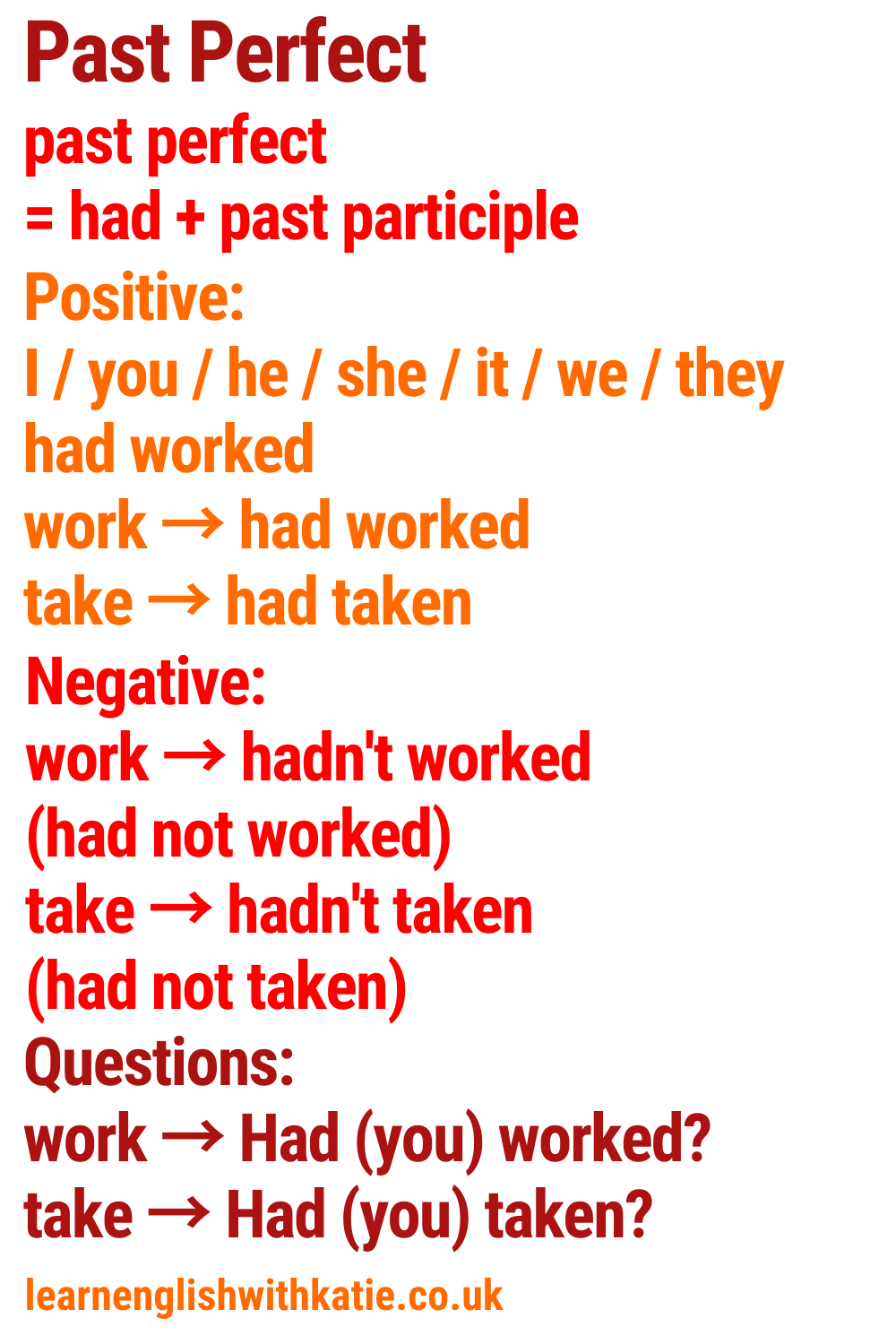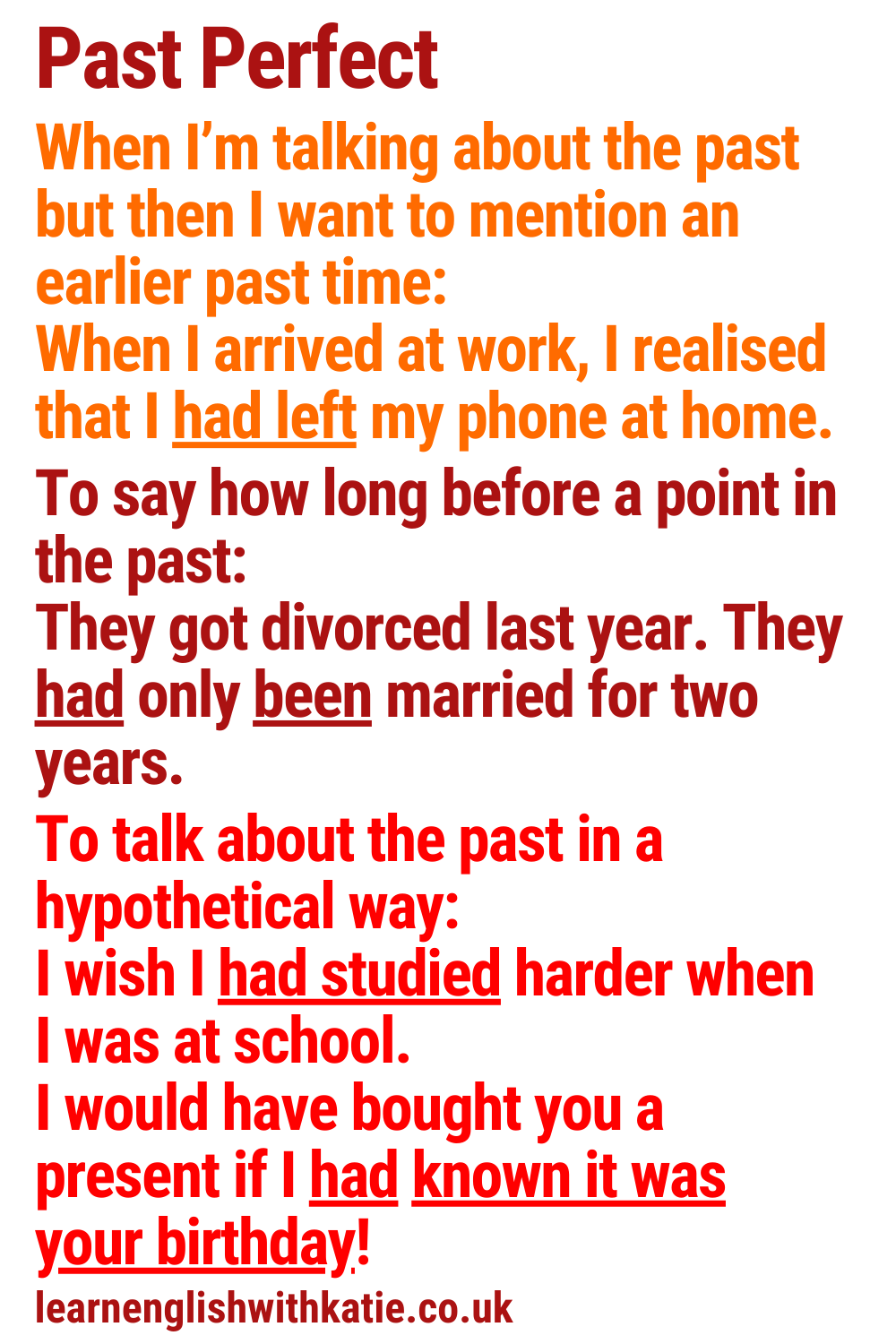|
I think this is actually one of the easiest tenses in English. It’s definitely easier than the present perfect! Basically, it means “the past before the past” or “more past”. A good way to understand this tense is to think about flashbacks in books and films. If I’m telling you a story about the past but then I need to go back even further in time to explain earlier events, this is called a flashback and it can be described with the past perfect tense. For example, the first Harry Potter book starts the story when he is eleven years old. Later we learn that his parents had died when he was a baby. Formation past perfect = had + past participle (The past participle is the -ed form for regular verbs or the third form in the irregular verb table. See appendix.) Positive: Be: I / you / he / she / it / we / they had been (Or: I’d / you’d / he’d / she’d / it’d / we’d / they’d been) Work: I / you / he / she / it / we / they had worked Take: I / you / he / she / it / we / they had taken Negative: Be: I / you / he / she / it / we / they had not been (I / you / he / she / it / we / they hadn’t been) Work: I / you / he / she / it / we / they had not worked Take: I / you / he / she / it / we / they had not taken Questions: Be: Had I / you / he / she / it / we / they been? Work: Had I / you / he / she / it / we / they worked? Take: Had I / you / he / she / it / we / they taken? Spelling For rules on how to spell the -ed form, see the post about the present perfect but for irregular verbs, the past participle is the third form and you just have to learn these. Uses 1. When I’m talking about the past but then I want to mention an earlier past time: When I arrived at work, I realised that I had left my phone at home. (Arrived and realised are past actions but had left is “more past”.) She failed the exam because she hadn’t studied enough. 2. To say how long before a point in the past: They got divorced last year. They had only been married for two years. I was sad about selling my house because I’d lived there for twenty years. 3. To talk about the past in a hypothetical way: (Mostly with “wish” and the third conditional.) I wish I had studied harder when I was at school. Why didn’t you tell me it was your birthday? I would have bought you something if I had known! Common mistakes 1. She didn’t been to Paris before. ❌ She hadn’t been to Paris before. ✔️ We only use “didn’t” in the past simple. Use “hadn’t” for the past perfect. 2. I’d never rode a horse before. ❌ I’d never ridden a horse before. ✔️ Make sure you use past participle (the third form, not the second). 3. She’d drived all night and was tired. ❌ She’d driven all night and was tired. ✔️ “Drive” is an irregular verb. Make sure you learn which verbs are irregular. 4. He had gone out shopping and the fridge was full. ❌ He had been out shopping and the fridge was full. ✔️ “He had gone” suggests he was not there at the time being spoken about but “he had been” suggests he had left and then returned. 5. I wish I went to the party last night. ❌ I wish I had gone to the party last night. ✔️ Use the past perfect, not the past simple, to talk about a hypothetical past. 6. I wish you would have told me. ❌ I wish you had told me. ✔️ Use the past perfect, not “would”. 7. If I would have known, I would have told you. ❌ If I had known, I would have told you. ✔️ There’s usually only one “would” in the third conditional. We don’t put “would” after “if”. Please note that I have heard the last three “mistakes” being used by native speakers of English, especially Americans, so perhaps it’s dangerous to say that they are wrong! Different people have different opinions on this. I’ll just say that the “corrections” are more standard English, especially in Britain. If you'd like to know what to study next, I suggest reading about the past perfect continuous here. To get free lessons and tips for learning English sent straight to your email inbox, click the button below and sign up:
0 Comments
Your comment will be posted after it is approved.
Leave a Reply. |
About the blogFollow the blog for mini lessons and tips on how to improve your English. Categories
All
Archives
July 2024
|


 RSS Feed
RSS Feed
